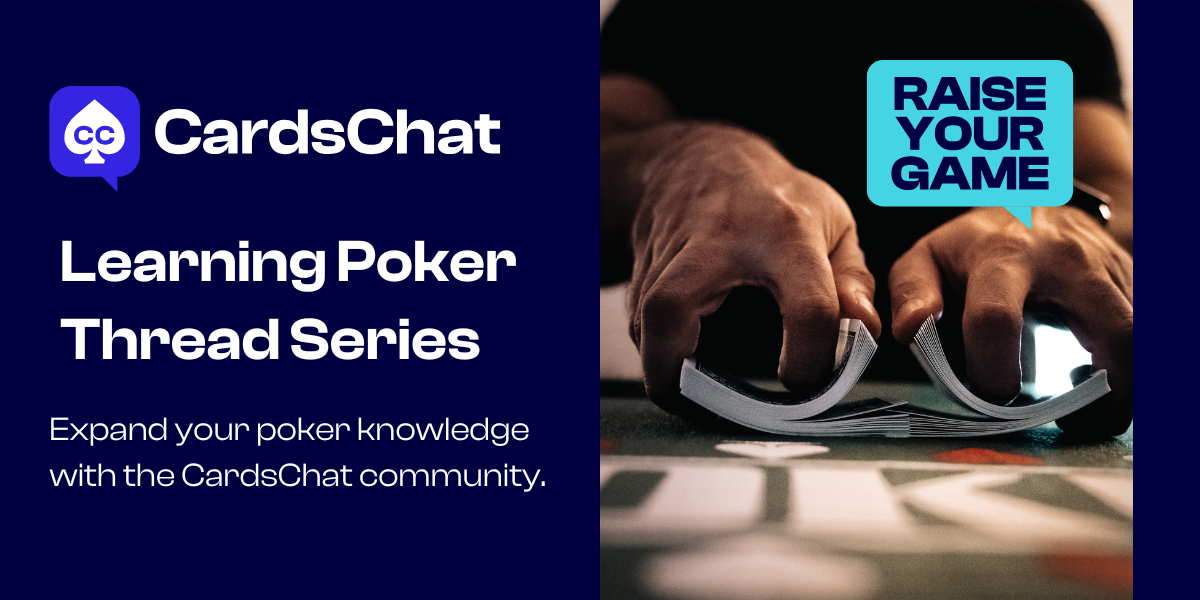CRStals
Moderator
Moderator
The most successful poker players take time out of their game to study. But where do you begin? In this four part series we're going to breakdown the ins-and-outs of studying your poker game:
Part 1: Studying Off The Felt
Part 2: Studying On The Felt
Part 3: Poker Review Tools and Solvers
Part 4: Reviewing hands
Let's get started with Part 1: Studying Off the Felt
We have all heard that it is just as important to study the game of poker as it is to play the game, but many players - myself included - have struggled with HOW to study poker. Do you take courses? Do you review footage of poker players streaming their games? Do you review past hands? How long should you study for? All questions that have caused some players to become frustrated, and essentially abandon studying. However, by looking at a few key points, you should be able to get your poker study game on track and improve your results, simply by implementing a routine.
What should go into your routine?
The first key takeaway is that your poker playing should go hand in hand with your poker studying. Focusing on one and not both could cause the balance between the two to become skewed, so it's important to make time to play and study.
Many pros advocate for a 3:1 ratio when starting out - meaning for every hour of time you devote to poker, 45 mins should be playing and 15 mins should be for studying. This should not be taken as a hard and fast rule; you may find that you need to spend more time initially studying and going over things because you need longer to focus and absorb it all. You may be playing multiple tournaments at one time which take much longer to dissect and analyze. Regardless of how you allocate your time, you need to make sure some is set aside on a regular basis for studying.
What To Study
Great - you have dedicated time to review and study poker, but what do you focus on? It can be overwhelming with the amount of content out there these days but try and keep it simple. To start out, focus on the obvious - your play.
It might seem obvious, but you need to pick one or two areas and focus your attention on that to get better. If you have a tool like PokerTracker4, what does it say your leaks are? If not, or if you don't have enough data in it, where are you losing the most money?
Taking Courses
The other thing you can incorporate into your study routines are courses. The amount of poker content out in the universe is immense and there are many quality free products you can choose to go through - our 30 Day Poker Training Course being one example. However, you should do your due diligence beforehand if you decide to take on a poker course as well. Keep these principles in mind:
Poker Streaming
The next area of study that you can consider is watching other players play. The best poker streamers are the ones who interact with their audience, and explain the story as to what is happening in the hand to the audience as the hand develops. These can be ideal to learn from pros and pick up countless pointers which can help your game, but there are a few dos and don'ts with them:
Poker Coach - Do You Need One?
I feel like this can be a sensitive topic because it will all depend on who you ask if you should get a coach or not. What I would say is ultimately it depends on a few factors:
If your bankroll can't handle that much, and you aren't able to make that plus playing poker, a coach is not a good option. This can be one of the quickest ways to go bust to be honest. So - how much can you afford to spend? Think of it like your poker bankroll - what stakes are you properly bankrolled to play, and if you took out money for a coach on a regular basis, or, a poker course that we spoke of earlier, could you absorb that into your playing, and still be profitable. If you changed poker course or coach for tournament buy-in or cash game buy-in, does it align to your bankroll?
We hope this has been informative to you for establishing a poker study routine and getting your game accelerated to the next level! Next week we'll dive into how studying while playing is just as important as studying off the felt! Make sure to subscribe to our CardsChat Learning Poker Thread Series Index, and turn your notifications on.

Part 1: Studying Off The Felt
Part 2: Studying On The Felt
Part 3: Poker Review Tools and Solvers
Part 4: Reviewing hands
Let's get started with Part 1: Studying Off the Felt
We have all heard that it is just as important to study the game of poker as it is to play the game, but many players - myself included - have struggled with HOW to study poker. Do you take courses? Do you review footage of poker players streaming their games? Do you review past hands? How long should you study for? All questions that have caused some players to become frustrated, and essentially abandon studying. However, by looking at a few key points, you should be able to get your poker study game on track and improve your results, simply by implementing a routine.
What should go into your routine?
The first key takeaway is that your poker playing should go hand in hand with your poker studying. Focusing on one and not both could cause the balance between the two to become skewed, so it's important to make time to play and study.
Many pros advocate for a 3:1 ratio when starting out - meaning for every hour of time you devote to poker, 45 mins should be playing and 15 mins should be for studying. This should not be taken as a hard and fast rule; you may find that you need to spend more time initially studying and going over things because you need longer to focus and absorb it all. You may be playing multiple tournaments at one time which take much longer to dissect and analyze. Regardless of how you allocate your time, you need to make sure some is set aside on a regular basis for studying.
What To Study
Great - you have dedicated time to review and study poker, but what do you focus on? It can be overwhelming with the amount of content out there these days but try and keep it simple. To start out, focus on the obvious - your play.
- Was your last cash game session profitable?
- Did you cash in your last tournament?
- What hands went wrong?
- What hand did you bust out on?
- Was there a hand you had to suck out to win?
- Was there a hand you felt you absolutely dominated?
It might seem obvious, but you need to pick one or two areas and focus your attention on that to get better. If you have a tool like PokerTracker4, what does it say your leaks are? If not, or if you don't have enough data in it, where are you losing the most money?
- Three bet pots where you are in position?
- Defending your small blind?
- Raising too wide from UTG
- Reading hands
- Narrowing opponent's ranges down
Taking Courses
The other thing you can incorporate into your study routines are courses. The amount of poker content out in the universe is immense and there are many quality free products you can choose to go through - our 30 Day Poker Training Course being one example. However, you should do your due diligence beforehand if you decide to take on a poker course as well. Keep these principles in mind:
- All courses are built differently and for different skill sets - be sure you choose one that suits your abilities and game variants best
- Remember that these courses are not built for one individual - you may get a lot or a little out of them
- Everyone will learn differently and you may need several courses to find the one that suits you best
- Free courses do not mean less than premium content; likewise, courses you have to pay for does not mean high quality content
- Poker courses that are a one-time fee vs courses that are subscription based
- What do you get for the course fee?
- What add-ons are available?
Poker Streaming
The next area of study that you can consider is watching other players play. The best poker streamers are the ones who interact with their audience, and explain the story as to what is happening in the hand to the audience as the hand develops. These can be ideal to learn from pros and pick up countless pointers which can help your game, but there are a few dos and don'ts with them:
- DO - Participate in chat and ask questions. Be engaged with the player
- DO - Take notes on the side. What are your leaks, and what does the pro do in those spots?
- DO - Play along as the opponent. Try and anticipate what they are going to do and put them on a range of hands. Were you right?
- DON'T - Assume what they do will work for you. They have a wealth of knowledge and their understanding of that situation is very specific.
- DON'T - Watch passively - if you are using this as time to study, you need to be analyzing what is happening and not simply watching the action.
Poker Coach - Do You Need One?
I feel like this can be a sensitive topic because it will all depend on who you ask if you should get a coach or not. What I would say is ultimately it depends on a few factors:
- Are you playing the game recreationally or trying to go semi-pro or even pro?
- What stakes are you playing and what stakes are you trying to get to
- How much time do you have to devote to the game
- What is your financial situation?
If your bankroll can't handle that much, and you aren't able to make that plus playing poker, a coach is not a good option. This can be one of the quickest ways to go bust to be honest. So - how much can you afford to spend? Think of it like your poker bankroll - what stakes are you properly bankrolled to play, and if you took out money for a coach on a regular basis, or, a poker course that we spoke of earlier, could you absorb that into your playing, and still be profitable. If you changed poker course or coach for tournament buy-in or cash game buy-in, does it align to your bankroll?
We hope this has been informative to you for establishing a poker study routine and getting your game accelerated to the next level! Next week we'll dive into how studying while playing is just as important as studying off the felt! Make sure to subscribe to our CardsChat Learning Poker Thread Series Index, and turn your notifications on.




















